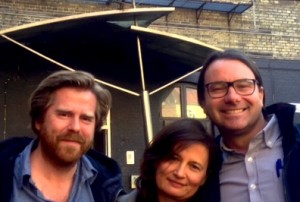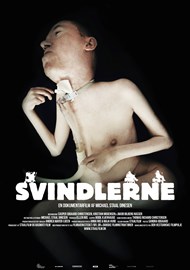“Skin and Bones” won the 2015 SPOT Film Awards: It is a documentary that breaks taboos, shows three incredible persons and may change your perception of sexuality, love and death.
By Annabella Stieren, Jutland Station.
Four hands tenderly slide down the naked skin of Casper’s chest. Their fingers carefully move, exploring his fragile body.
“I don’t want to hurt you,” a women’s voice whispers into the room, veiled in matted reddish light.
Casper answers, but it is hard to understand his voice. Usually he needs a speaking computer. His moans of pleasure are interrupted by the gurgling sound of a lung ventilator. Casper (Søgaard) suffers from Muscular dystrophy (MD), a disease that gradually weakens a person’s muscles over time.
 In the documentary “Skin and Bones” (Original title “Svindlere”), Caspar is filmed while two prostitutes caress and touch him. It is a brutally honest and provocative moment, and it is the jury’s favorite scene of this years’ SPOT Film festival. The documentary impressed member Janus Metz, who recently directed two episodes of True Detective:
In the documentary “Skin and Bones” (Original title “Svindlere”), Caspar is filmed while two prostitutes caress and touch him. It is a brutally honest and provocative moment, and it is the jury’s favorite scene of this years’ SPOT Film festival. The documentary impressed member Janus Metz, who recently directed two episodes of True Detective:
“Especially the sex scene is truly debatable, powerful and challenges the audience,” he told Jutland Station after the award ceremony.
Together with the two other jury members Pernille Christensen, a Danish award-winning director and Christopher Tidman, a UK-based short film distributor he decided to give one of the 2015 SPOT Film Awards to this “deeply moving and courageous film” at Øst for Paradis last Sunday.
For more than three years director Michael Dinesen and his camera accompanied the three main characters of his film Kristian (Mugge), Casper (Søgaard), and Jakob (Nasser), who suffer from the same incurable muscle disease. Their tiny bodies look breakable, their legs almost do not exist: “Skin and bones” is the term they self ironically use for themselves. In a specially equipped house they live together as friends and neighbours; constantly surrounded by 24-7 professional caregivers. They help them dress, wash, move, eat but also drink, dance and party. Even though they are confined to their wheelchairs, the film shows their almost heartbreaking joy for life, their most human desires for intimacy, love, friendship and their ubiquitous knowledge of their short life.
Death…
 For the director “death” was the aspect that first made him interested in filming people with MD.
For the director “death” was the aspect that first made him interested in filming people with MD.
“How do people that obviously know that they have a short life deal with it? Do they have a different approach than we do?”
He first met the three men, when he was teaching at Egmont Højskolen in Åarhus. Soon he realised that they have a much more serene and accepting attitude towards death than others. In the film their often black-humoured jokes about their own condition indicate that. The most common form of muscular dystrophy affects mainly boys and is caused by a faulty dystrophin gene. The pelvis and legs are usually affected first, causing difficulty walking, with the first signs appearing between the ages of one and three. In their infancy the boys can still walk or jump on a trampoline as Jakob does in an old family video. But when reach the age of eight to eleven, most sufferers are in need of a wheelchair.
…love
If we look back only twenty years ago, children diagnosed with MD would not survive their teenage years. However, improvements in multidisciplinary care have extended the expectancy and improved the quality of life significantly. Jakob, Casper, and Kristian belong to the first generation that can now survive even into their 40’s.
“It is the first generation that gets an adult’s life – and all the joy and problems that come with it,” director Dinesen explains.
This is what made him change his approach towards the film: How do they deal with the desire of falling in love within their exceptional life conditions? In interviews the three main characters share almost wise thoughts about love, first crushes on girls, butterflies in their stomachs their wish for a girlfriend – always aware that they are not able to live up to the wild women-charming partyanimals they are inside. Still they seem to appreciate every moment and take their destiny with a grim scathing humour.
… and Intimacy
One thing that the three men feel will always be missing in whatever relationship they might have is intimacy.
“They have a very different relationship to prostitution. They never experienced the ‘real love.’ For them, prostitution is the only way to get close to it,” director Dinesen explains.
Sexual needs of disabled people are still a taboo for society. Dinesen’s documentary tries to break it by showing that since long-term loving relationships are mostly off the table, paying for sexual services remains the only option to overcome the emptiness they are experiencing. The camera follows them on their long-awaited summer trip to Berlin. The program: sightseeing, having fun with friends, drinking and partying and visiting prostitutes – just like a usual bachelor’s weekend. It only takes more preparation, three transporter busses filled with equipment, custom-build beds and a team of helpers.
A Question for society
Back in 2012 it was suggested to forbid caretakers to help disabled people to arrange contact with prostitutes in Denmark. Back then Sofie Nielsen, equality spokesman for the Social Liberals stated: “Prostitution is harmful therefore it is not something we should encourage public staff to help with.” Certainly, one of the central questions about payed sexual services for people suffering from disabilities remains: Is one suppressed group just taking advantage of another suppressed group? Producer Ellen Riis defended the approach by saying:
“We know that this is highly controversial, but since prostitution is legal for everybody, why shouldn’t it be for them?”
Director Dinesen adds: “Maybe prostitution is not the right way? But as you can see, they miss touching and being touched the most and society must somehow find a way to deal with it.”
The sex scenes themselves are incredibly intimate and almost disturbing. Though, they show real pleasure and one has to admire the access director Michael got to the people and thus the story.
“The boys have a different relation to their bodies, they are naked in front of people every day. Of course some of them are more shy than others, but generally it was not hard to convince them.”
However, finding women that would participate in front of the camera was challenging; in the film one can never see their faces. The three men are also well aware that it is not true love they get.
“But when can you tell that something is true? When can you get the feeling that it is real? That touched me very much,” director Dinesen tells.
Admirably, the documentary manages to not only focus on the sexuality of people suffering from disabilities such as MD. It is moreover a film about the human desires for intimacy, love friendship and the fuzzy borders surrounding it. Portrayed by three incredible individuals that one can learn a lot from: Do not let the most horrendous conditions constraint your excitement and curiosity for life – be grateful for the fortune you have being alive.
- – –
Annabella Stieren is a German journalist based in Aarhus, and currently one of the Culture Editors for Jutland Station.